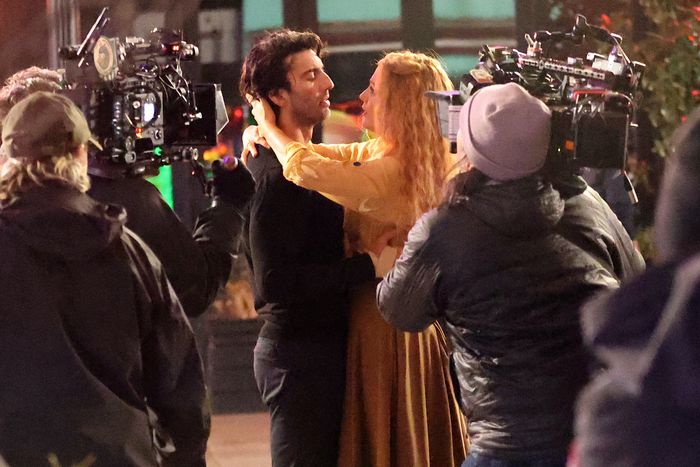
In its first week out, It Ends With Us, the film adaptation of Colleen Hoover’s best-selling book about a domestic-violence survivor, usurped Deadpool & Wolverine for the No. 1 box-office spot and earned $100 million globally. But that’s not what everyone’s talking about. Instead, everyone’s wondering what the hell is going on between stars Justin Baldoni and Blake Lively. Things have gotten so strained that Baldoni hired Melissa Nathan, an industry crisis-manager veteran who has represented high-profile (and controversial) people like Johnny Depp, Logan Paul, and Drake.
Rumors about tension between the principal cast began after Baldoni — who also directed and produced the film with his company, Wayfarer Studios — was not photographed with his fellow cast members at the New York premiere on August 6. He sat in another theater the night of the premiere and did not introduce the film alongside Lively and Hoover. He was also absent from paired or group interviews and promotional appearances for the duration of the press tour. After fans noticed this odd behavior, they started keeping a closer eye on Lively and Baldoni, trying to suss out why the two had a perceived falling-out. Many are speculating that they could have butted heads about how to promote the film’s sensitive subject matter (Lively has been criticized for talking about her new hair-care line more than domestic violence), or that Baldoni didn’t like Lively and her husband Ryan Reynolds’s reported involvement in the film. The week after the movie’s U.S. release, sources alleged to TMZ that Baldoni made inquiries about Lively’s weight and lingered too long in a kiss during filming, which could be why they’re keeping a distance.
We asked Holly Baird, a crisis-management consultant, to answer all our questions about the messy situation.
What would a crisis-management team be doing for Justin Baldoni right now?
In this instance, she would figure out what the truth is — talk to production and see what really occurred and then see if your client actually has an issue or if it’s just production mismanagement. I think a lot of the issues back in the Weinstein era could have been diffused if there was somebody on set for the actors and the staff to talk to.
Why do you think an actor hires a crisis manager in the first place?
It might be to get in front of something if some sort of allegations might be coming out. The one that raised my eyebrows was the report that he was allegedly kissing her too long. Sometimes, where there’s smoke, there’s fire. Sometimes, it’s just people making shit up on the internet.
How would you advise the actors?
First, I would need to know what’s actually occurring, and it’s essential to approach the situation with some sort of neutrality. At the end of the day, you’ve got to focus on the common goal: make a great product. I don’t think that it should ever get to the point where gossip is being leaked from a movie set.
What specific advice would you give Baldoni?
None. I’m “Team” Blake. However, honesty is key: Address the issue, take the necessary steps to correct the behavior, and present your best self moving forward. Everyone has a bad day, but how you respond afterward shows your true character and is what people will remember. This production was a new experience for everyone involved, both creatively and professionally, which means there’s ample room for growth and improvement.
The theme of the movie involves domestic violence. Do you think this sort of press is negatively affecting the messaging of the film?
I have represented a leading domestic-violence organization for about a decade. It starts at home, and “at home” would be this production set. If there are some allegations of inappropriate behavior, it needs to be addressed right away, because it never really is just one person. It starts with one person, and then one person doesn’t say anything, and it snowballs.
You referenced Harvey Weinstein earlier. Do you think that now people are more eager to nip any negative behavior early on?
One hundred percent. Whether it’s a production set, a university — nobody wants to be the next headline.
How often do co-stars get into situations like this and turn to a crisis-management team to handle it?
I’ve never heard of anything like this; that’s why I’m a bit taken aback. I don’t think we know the full story, and we shouldn’t jump to conclusions too quickly. In environments where people let their guard down and where actors are being put in vulnerable situations, it’s on Hollywood and the production to protect their cast. It’s odd that Melissa’s name was mentioned, because the whole story hasn’t really come out yet. Either she’s promoting herself or someone’s letting Justin know, We’re on to you, and your days are numbered.
What’s a typical day like for you as a crisis-management expert?
I wake up at around 5:30 a.m. and check my phone to see if the world’s blown up or if anything in my clients’ world has gone upside down. Then I can close my eyes for a little bit and just kind of reset for the day. I appreciate sometimes having time off, because when you’re in the middle of a crisis, it’s all hands on deck.
If a client needs something pushed out to the media, I’m going to go through my media list and see who I think would be a good outlet for this story, and then I go online and check to see if anyone’s picked it up. If I’m meeting with a reporter, we also talk about other stories that could be percolating, and then, honestly, check on their families. We’re human beings.
How in demand are crisis-management professionals right now in Hollywood?
Summer is always slower. It’s always around the holidays that everyone seems to get in trouble. Right now, there are a lot of people just really kind of trying to fly under the radar, especially after Diddy. When the initial Diddy stories broke, people were contacting crisis folks and lawyers, but now it’s quiet. Everyone’s just trying to wait and see who is going to be the next headline.
Can you describe a strategy you have used in one of your recent cases?
I’m working with a client now who is not a celebrity, but we’re going up against a celebrity. When you are going up against someone who is just very beloved and people think they can do no wrong, it’s harder to get that story out. It’s not always about representing Goliath. Sometimes, David needs representation, too.


